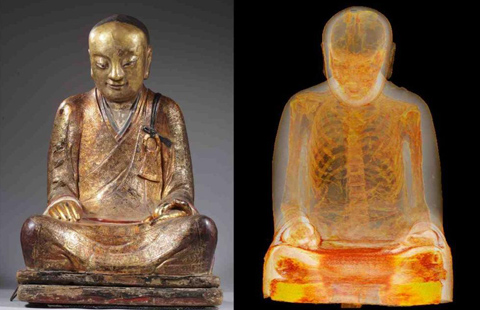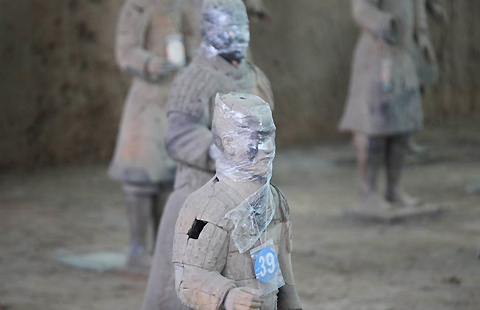Chinese firms see Hollywood bright lights
Updated: 2015-02-24 12:09
By Cindy Liu in Los Angeles(China Daily USA)
|
|||||||||
The recent success of Chinese-backed firms with the academy that awards the Oscars is a reflection of the growth of Chinese investment in the US entertainment industry.
Digital Doman, a Venice, California-based digital production company that was backed by investors from Hong Kong, received an Oscar nomination in January. Its production, one of the world's highest-grossing films in 2014, X-Men: Days of Future Past, was nominated for Best Visual Effects at the 87th Academy Awards.
It was the second Academy Award nomination for the company, formerly known as Sun Innovation. Its work on Iron Man 3 earned it an Oscar nomination last year.
The Academy of Motion Picture Arts and Sciences also handed two Scientific and Technical Awards to Digital Domain for its technologies: Mova, a facial performance-capture system, and Drop, a software toolkit for simulating large-scale destruction scenes.
Hong Kong entertainment company Sun Innovation paid HK$392 million in July 2013, to acquire the American visual-effects group from Galloping Horse. In 2012, Beijing Galloping Horse purchased 70 percent of Digital Domain, while Reliance Media retains 30 percent.
With its acquisition of Digital Domain 3.0, Sun Innovation intends to expand its reach, playing a significant role in the growing international feature film market.
The year 2014 saw a big increase in Chinese film and media companies opening Hollywood branch offices. Partnership and co-financing were seen as the golden tickets to Hollywood for many Chinese investors.
Shanghai-based media group Fosun joined with Hollywood producer Jeff Robinov, the former Warner Bros. chief, and set up Studio 8 in 2014.
Fosun, and Huayi Brothers, had competed to acquire Studio 8.Huayi Brothers announced an intended $150 million investment. Fosun soon raised its offer to $250 million and successfully closed the deal with Studio 8. It was the biggest acquisition by Chinese capital in Hollywood film companies in history.
Sony Pictures took the distribution rights of all of Studio 8's films in the global market except for the greater China region.
Bona Film Group, China's largest privately owned distribution company, announced a few month later in end of 2014 that it had obtained the exclusive distribution rights in China of several co-productions with Studio 8, including Ang Lee's Billy Lynn's Long Halftime Walk which will start shooting in this April.
To many observers, both American and Chinese, these deals are considered an achievement of Chinese capital in Hollywood. And the courtship between wealthy Chinese investors and the American film industry is only intensifying.
Chinese investment in U.S. entertainment, including film, has grown to around $2.7 billion from the year 2000, according to the Rhodium Group, which tracks Chinese direct investment in the U.S.
Le Vision Pictures established a Los Angeles office in 2013 with a $200 million investment. By the end of 2014, it had more than 10 employees, serving as the creative engine in a so-called LeTV ecosystem, or a "Beijing-Los Angeles-Silicon Valley" business model. LeTV group owns the largest online-film library in China.
Wanda Group, China's largest commercial property developer and owner of the AMC theater chain, announced its first major entertainment real estate purchase in Los Angeles last August with a $1.2 billion investment.
Wang Jianlin, chairman of Wanda Group, said his efforts in Los Angeles are aimed at leveraging Hollywood's solid film-industry resources to support the group's Qingdao Oriental Movie Metropolis and Qingdao International Film Festival projects in China.
Robert Lundberg, senior vice-president of China Lion Film Distribution, said that Wanda's purchase was a "smart move" because Chinese investors can control what is in the acquisition. He believes that such a flow of Chinese investors are good for American filmmakers, too.
"On the other hand, there are so many talents in China," Lundberg said. "Lots of American producers just don't know how many resources there are in China."
"I think in today's global economy, Chinese companies' increasing interest in media and entertainment is a positive," said Hollywood film veteran Stephan Manpearl, owner of Manpearl Entertainment Marketing.
cindyliu@chinadailyusa.com
- Planning for the future family as society ages
- Ratings of China's Spring Festival gala hit new low
- Rail modernizations civilize Spring Festival travel rush
- Thousands affected by SW China earthquake
- Discipline watchdog names 855 for violations during holidays
- Nursing home killer in fury over unpaid wages

 Festive dragon
Festive dragon
 Riding in style
Riding in style
 Chinese volunteers make the homeless feel at home
Chinese volunteers make the homeless feel at home
 Monk's body found concealed in Chinese Buddha statue
Monk's body found concealed in Chinese Buddha statue
 Lady Gaga, Julie Andrews notch Oscars' top social media moment
Lady Gaga, Julie Andrews notch Oscars' top social media moment
 Restored terracotta warriors don 'scarves' and 'dresses'
Restored terracotta warriors don 'scarves' and 'dresses'
 Texas Lunar Festival fun
Texas Lunar Festival fun
 Stars arrive at 87th Academy Awards
Stars arrive at 87th Academy Awards
Most Viewed
Editor's Picks

|

|

|

|

|

|
Today's Top News
Advocates optimistic on immigration
Foreign minister cites key principles
Petition seeks to overturn officer charge
China highlights dos, don'ts in intl relations
Google teams up with 3 wireless carriers to combat Apple Pay
Kiwi opposition blasts troop deployment to Iraq
It's not just the gift, but the thought behind it
Savoring benefits of medicinal foods
US Weekly

|

|








